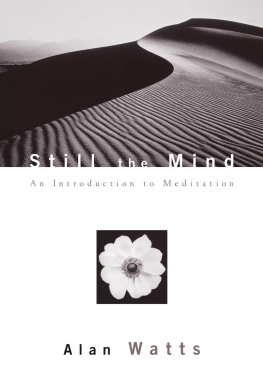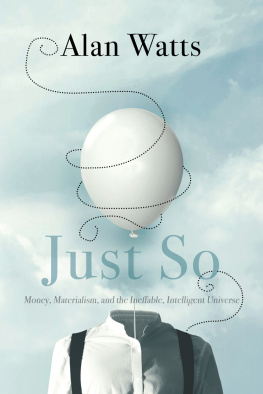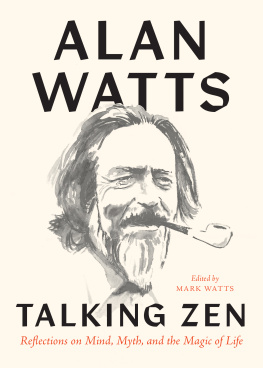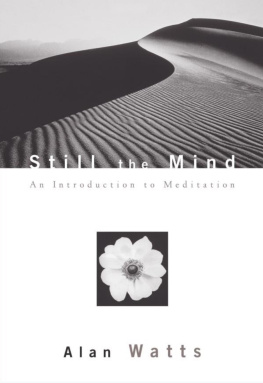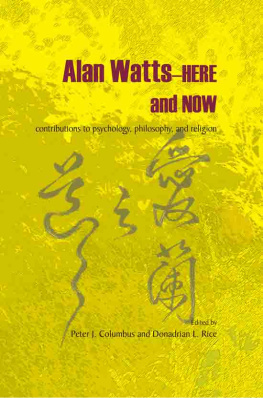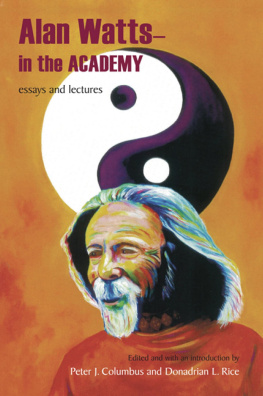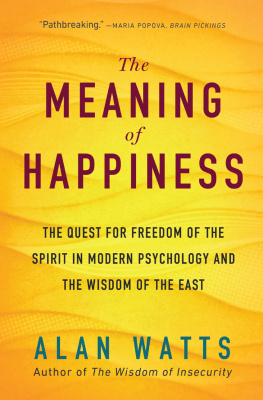Still the Mind
Still the Mind
An Introduction to Meditation

Alan Watts
N EW W ORLD L IBRARY
N OVATO , C ALIFORNIA

New World Library
14 Pamaron Way
Novato, California 94949
Copyright 2000 by Mark Watts
Editors: Mark Watts, Marc Allen
Cover design: Big Fish
Text design: Tona Pearce Myers
All rights reserved. This book may not be reproduced in whole or in part, or transmitted in any form, without written permission from the publisher, except by a reviewer, who may quote brief passages in a review; nor may any part of this book be reproduced, stored in a retrieval system, or transmitted in any form or by any means electronic, mechanical, photocopying, recording, or other, without written permission of the publisher.
Library of Congress Cataloging-in-Publication Data
Watts, Alan, 19151973.
Still the mind : an introduction to meditation / Alan Watts.
p. cm.
1. Meditation. I. Title.
ISBN 1-57731-214-7 (alk. paper)
BL627.W38 2000
291.435dc21
99-462340
First paperback printing, February 2002
ISBN 1-57731-214-7
Printed in Canada on acid-free, partially recycled paper
Distributed to the trade by Publishers Group West
10 9 8 7 6 5 4 3 2 1
What I am really saying is that you
dont need to do anything,
because if you see yourself in the correct way,
you are all as much extraordinary phenomenon
of nature as trees, clouds, the patterns
in running water, the flickering of fire,
the arrangement of the stars,
and the form of a galaxy. You are all just like that,
and there is nothing wrong with you at all.
Alan Watts
C ONTENTS



A LAN W ATTS BECAME FAMOUS in the 1950s as a brilliant, intense intellectual, a former Episcopalian priest with a vast knowledge of both Eastern and Western religious and spiritual traditions. Unlike most of his peers, though, he embraced and actually practiced the various traditions he studied. His understanding, expressed through a great number of books and public talks, was peerless.
In the 1960s, he became a serious student of Zen Buddhism, and was a teacher and eventually dean at the American Academy of Asian Studies (now CIIS, the California Institute of Integral Studies). The popularity of his books and talks soared. He gave a weekly talk on San Francisco public radio that was broadcast nationally. A large number of people listened every Sunday morning; many considered it their church service.
Watts lived on a houseboat in Sausalito, just north of San Francisco, which became renowned as a center of endless discussions, parties, and meditation sessions, with famous and infamous spiritual leaders, gurus, intellectuals, writers, and others continually dropping by.
He continued to practice his meditation, and his writing and talks deepened. More and more, he was leading people into meditation and spiritual experience rather than just talking about it.
In the last years of his life, he left the houseboat and retreated to a small, isolated cabin deep in the woods. He spent nearly every morning alone, usually beginning with a Japanese tea ceremony followed by a period of meditation and contemplation. Then he would write.
His writing and speaking grew quieter and deeper. This book has been transcribed from recordings of several talks he gave in his later years. They show a maturity and an understanding of his subject that only comes after years of meditation. He had transformed over the years from a serious intellectual to a joyous, spontaneous lover of life.
His words are still leading-edge, as fresh today as when they were spoken many years ago. He is a writer and student and teacher who will be remembered, and this book shows us why:
He is able to use words to take us beyond them; he is able to instill in readers and listeners not only an understanding of meditation but an actual spiritual experience as well.


I N THE BEGINNING of Still the Mind, Alan Watts mentions the gift he had been given and it was a unique gift. Watts was able to take his readers and listeners on a journey beyond the often-ignored limitations of calculation and reckoning. Perhaps the greatest part of this gift was his ability to show us how to discover simple ways of getting out of the mental trap we create for ourselves.
In our modern society, it has become apparent that the power-based world the world of politics, government, and international finance that influences all of us has been absolutely hypnotized and driven crazy by words and by thoughts. We have become slaves to recurring patterns in an endless stream of words. Our political leaders talk incessantly about our many problems, but its as if theyre speaking a foreign language one might call memorandese. Almost everyone has had the experience of watching a political debate and wondering afterward what on earth the candidates were talking about. To some degree, all civilized people are out of touch with reality because we fail to distinguish between the way things are and the way they are described. For politicians this dichotomy has reached extreme proportions, but it affects everyone. We confuse money, which is an abstraction, with real wealth; we confuse the idea of who we are with the actual experience of our organic existence.
During the sixties and early seventies, Alan Watts lectured at universities and blossoming growth centers across the country. To help his audiences better understand their connection with the world, he would describe in great detail the many ways that our organic existence inseparably connects us to the entire world. Starting when I was sixteen, and on into my early twenties, I followed along whenever I could with a portable tape deck, recording his talks.
Whether the title of his talk was Ecological Awareness, The Psychology of Mystical Experience, or The Practice of Zen Meditation, he would often return to the theme of the inseparability of man and world. It was something he grasped on a deep level and could invariably help his audiences understand. His essential point was that ones actual organic being is inseparable from the universe, but the distinct idea you have of this distinct wiggle of the whole universe, which you call your body, can very easily persuade you to accept the illusion that you are a separate entity.
One reason we fall for the idea of the separate, isolated self is that, even though we admire the beauty of the natural world, nearly everyone who has grown up in Western society has certain misgivings about actually living as an integral part of nature. Instead, we adopt certain conventions that allow us to live in modern society; we cultivate our consciousness in order to rise above the level of natural instinct.
At one extreme, we are rugged individualists who feel the need to conquer the physical world and claim new territory for mankind. But even those who do not try to dominate the world in a physical sense may try to overcome what they perceive as their animal nature through the repression of their natural desires. We see this manifested nearly everywhere in our culture in conscious attempts to adhere to abstract ideals of virtuous living.
Next page
